Today we travel to a future where your microbiome becomes a key part of your identity. From health to your child’s kindergarten, here are all the ways knowing about your microbiome might impact your life.
Let’s start with a definition: what is the microbiome? Simply put, the microbiome is the collection of microbes (mostly bacteria) that live in and on your body. It’s hard to say exactly how many microbes make up the human microbiome, but researchers estimate that somewhere between 500 and 1,000 different species of bacteria live in the human gut. And that’s just the gut, there are microbial communities in our mouths, on our skin, in the vagina, all over the place. To put things in another perspective, the average human body is made up of 30 trillion cells. And on top of those 30 trillion cells, the average human also carries around in and on it, 40 trillion bacteria. 40 Trillion!
To learn how those 40 trillion cells might be leveraged in the future, we talked to Ed Yong, the author of the upcoming book I Contain Multitudes; Rachel Feltman, a science blogger at the Washington Post; and Jessica Richman, the cofounder and CEO of uBiome, a personal microbiome company. The three of them walk us through the pros, cons and surprising ways the microbiome might be used in the future.
The microbiome is a really promising area of research because it seems to interact with so many elements of our health. People are studying links between the microbiome and everything from autism to heart disease to body odor to cancer. But the gap between what we know right now, and what we’d need to know to develop microbiome based treatments for most of these things, is huge.
Right now there are no drugs on the market that are based on the microbiome, and there’s really only one microbiome related medical application that reliably works. And that’s for patients with an infection called Clostridium difficile or c. diff who get a fecal transplant. The c. diff infection is awful, and it totally ravages the guts of those infected with it. A jolt of health bacteria, in the form of donated fecal matter, can be life saving.
While the gut microbiome might get all the glory, there are lots of other microbiomes that impact our wellbeing as well. Doctors are trying to figure out whether children born by C-section might miss out on some crucial microbes that other children get when they pass through the vaginal canal. One recent study actually used wet wipes with the mother’s vaginal microbes on them on newly C-sectioned babies to see if it helped. There are concerns about that method too though.
Of course with any promising scientific breakthrough there will be people trying to apply it to pretty much everything. In the episode we talk about what happens when certain microbes start getting connected to talent or personality, or associated with negative traits. We’ve already seen that with genetic information, so why not microbial?
This week we also bring a new segment to the show! I play a few voicemails that listeners sent about mosquitoes from last week. I really loved the funny and thoughtful messages you sent me so keep telling me what you think! I’ll feature them each week. Call us and leave a voicemail at (347) 927-1425. Or, send a voice memo to info@flashforwardpod.com. For instructions on how to do that, go here. And you don’t just have to tell us what you think about this future. If you want to suggest a future, you can do that too! I love hearing your ideas, so keep sending them!
Flash Forward is produced by me, Rose Eveleth, and is part of the Boing Boing podcast family. The intro music is by Asura and the outtro music is by Broke for Free. The episode art is by Matt Lubchansky.
If you want to suggest a future we should take on, send us a note on Twitter, Facebook or by email at info@flashforwardpod.com. We love hearing your ideas! And if you think you’ve spotted one of the little references I’ve hidden in the episode, email us there too. If you’re right, I’ll send you something cool.
Some of you might have heard us on Planet Money last week, if not go check out that episode it’s really fun it’s about all the various promises and policies that the current presidential candidates are putting forward, and what would happen if they actually got their way. Super special thanks to Tamara Krinsky and Brent Rose who provided voices for those futures. And I hide two references in that episode so if you can find them let me know, and I’ll send you the little prize I’ve made.
And if you want to support the show, there are a few ways you can do that too! We have a Patreon page, where you can donate to the show. If you do donate, you’ll get lots of cool stuff, including a transcript of the show and access to a special newsletter that I pack with really awesome stuff. But if that’s not in the cards for you, you can head to iTunes and leave us a nice review or just tell your friends about us. Those things really do help.
That’s all for this future, come back next week and we’ll travel to a new one.
▹▹▹▹▹▹▹▹▹▹▹▹▹▹▹▹▹▹▹▹▹▹▹▹▹▹▹▹▹▹▹▹▹▹▹▹▹▹▹▹▹▹▹▹▹▹▹▹▹▹▹▹▹▹▹▹▹▹▹▹▹▹▹▹▹▹
TRANSCRIPT
Hello and welcome to Flash Forward. I’m Rose and I’m your host. Flash Forward is a podcast about the future. Every week we explore a specific possible or… not so possible future scenario. Everything from space pirates to antibiotic resistance. Every episode starts with a little field trip to the future, before we zip back to today, to talk to experts about how that future might really go down.
Got it? Great. Let’s start this episode in the year 2032.
[Sound of kids playing]
Hi! Welcome to Döderlein!
Can I get you some water? We have sparkling or ultra-filtered.
I’m so glad you came by to see the school! It’s so important to really understand what we do here so you can make the best choice for your little genius. The kids here get the very best educational experience. We combine and inquiry-based learning program with a wholly custom microbiome to activate every student’s inner good-genius. We believe that under the right conditions every child can thrive wholly through inquiry, a healthy environment and intellectual courage.
Our application process is really simple! We just need you to fill out this form and have your doctor send in a microbiome sample for your little boy, Burton. We get so many applications that it can be really hard to pick between all the little geniuses that come through, but we really emphasize a holistic education and we try to make sure every student’s inner ecosystem can fit and flourish here in ours.
I’m blabbering now, here, take this pamphlet with you, it explains everything.
[Commercial Sad Music]
Are you tired of trying every weight loss trick in the book? Sick of dieting and seeing no results? Fed up with endless trips to the gym and no change in the scale? There has got to be a better way.
[Commercial Happy Music]
Well now there is! Introducing bioME, the very first personalized weight loss solution that really works. bioME’s patented personal microbiome technology will get you the results you deserve without having to give up your favorite foods, or spend hours in the gym. Simply send us a few easy samples of your microbial world, and we’ll formulate a treatment just for you.
And now, if you call in the next 20 minutes, you can get two months of bioME for the price of one! Call now, deals like this don’t last!
[Fade Out]
Cheering
Music Up
Today, on the Maude show, we’re catchin’ cheaters. This woman says her man wasn’t loyal.
[yelling]
But he says she’s just being too suspicious. We turn to the tests, do their biomes match? Or are his bugs going to give him away.
[screaming]
[music fades out]
….
Rose: Okay so in this future we’ve got personalized microbiome medicine, schools, courts, everything.
But let’s back up a little bit. Because first we need to talk about what a microbiome actually is.
Ed Yong: Okay so every person contains tens of trillions of bacteria and other microbes in their gut, on their skin, in and around their bodies.
Rose: That’s Ed Yong, a science writer at The Atlantic, and the author of an upcoming book about microbes called I Contain Multitudes.
It’s hard to say exactly how many microbes make up the human microbiome, but researchers estimate that somewhere between 500 and 1,000 different species of bacteria live in the human gut. And that’s just the gut, there are microbial communities in our mouths, on our skin, in the vagina, all over the place. To put things in another perspective, the average human body is made up of 30 trillion cells. And on top of those 30 trillion cells, the average human also carries around in and on it, 40 trillion bacteria. 40 Trillion!
And these 40 trillion microbes do all sorts of really important things.
Yong: We know that they help to sculpt our organs and tune our immune system and digest our food, they probably help to shape our behavior and to protect us from disease. So they’re really important.
Rachel Feltman: Because people’s health seems to be at least correlated to so many different species of microbes, a lot of researchers are interested in hacking that, and saying you know, what are the microbes that live in the gut that support not being obese and what are the ones that make you less likely to develop diabetes or help protect you against the kind of bacterial infections that cause really bad gastrointestinal illness.
Rose: That’s Rachel Feltman, a science blogger for the Washington Post. She suggested this episode! And she’s been tracking the future of the microbiome.
So the premise here is this: There are bacteria living in and on you. Some of those bacteria impact your health. And if we can control the bacteria we can make you healthier. People have talked about using microbiome based medicine to treat everything from
Feltman: Having a pill you could take that kept you, or at least made it really unlikely for you to become overweight
Yong: And on the flip side malnutrition, diabetes and other metabolic disorders, they’re looking in disorders of inflammation.
Feltman: Creating kids who don’t have allergies
Yong: Allergies, asthma, type one diabetes, multiple schlerosis
Feltman: Could we hack armpit microbiome to keep people from having BO?
Yong: They are looking at cancer because there seem to be links between the microbiome nad colon cancer. They’re looking at heart disease
Feltman: Could we make yeast infections less common? That would be great.
Yong: Pick a condition, chances are there’s some group somewhere studying links between that and the microbiome. You know a lot of this excitement is justified, there’s a lot of promise here. All the the future that I talked about is potentially real. Theoretically you could make that happen, you could get to a point where you’re prescribing personalized cocktails of microbes to people in ways that significantly improve their health. I think that is entirely feasible.
Rose: But before we go too far into the future, let’s talk about what we can do right now with the microbiome.
Jessica Richman: There are concurrently no drugs that are approved drugs for doctors to prescribe that are microbiome based.
Rose: That’s Jessica Richman. She’s the cofounder and CEO of a company called uBiome. uBiome started as a crowdfunding campaign back in 2013,
Richman: Which is kind of a crazy way to start a biotech compnay. But started our campaign on Indiegogo, we had no idea whether it was going to work whether anybody would pay any attention at all, and it just exploded fantastically. Within10 weeks we had over 2,500 people involved, it was $350,000 which at the time was an unimaginable amount of money, kept us going for the whole first year.
Rose: So now they’re a full fledged company that will sequence your microbiome for you.
Richman: You can order up to 5 sites, so there’s nose mouth skin gut and genitals, so both male and female there’s a vaginal kit and a penile kit. And what we do is you we send you a box it has a swab and some tubes in it and you swab the affected areas, so for the gut microbiome you swab the toilet paper, and for the vaginal microbiome there’s a protocol for swabbing the vaginal opening, for the mouth you swab inside the mouth. And then you stick the swab in the tube, you shake it up, and send it back to us, so it’s a pretty easy process it takes a minute to swab and a minute to shake it up, you just put it in the mail and send it to us.
Rose: When you get your results back, the uBiome team tries to tell you how your microbiome compares to everybody else’s that they’ve sequenced — what species you have that are more abundant or less, and what you might want to know about those microbes. And they’re hoping to add some clinical information to that soon. They haven’t announced what tests they’re doing yet, but it could be things like what your microbes might say about the drugs you should or shouldn’t take, or how they might relate to the weird stomach issues you’ve been having.
Richman: Our mission is to take this data, get as much of it, as much useful data as possible and turn it into insights that can be used to take this new emerging field of the microbiome and turn it into something really valuable that people can use.
Rose: When it comes to using microbiome related information for treatments and medicine, right now there’s really only one application that reliably works. And that’s for patients with an infection called Clostridium difficile or c. diff
Yong: this bacterium that causes really nasty diarrheal infections. The reason that fecal transplants work so well for this particular condition is that people with c. diff their guts are like a wasteland, they’ve been taking loads and loads of antibiotics kind of nukes the ecosystems in their digestive tract, and that’s been replaced by this one incredibly weedy species c. diff. Now when you shove a load of other microbes like, a more thriving diverse community from a donor stool, into that system, it’s much easier for them to then take over.
Rose: So in patients who are suffering from this infection, whose guts have just been totally decimated, an input of healthy fecal matter can be life saving.
Feltman: It’s miraculous, it works better than antibiotics it works for people who have not been successful with antibiotics. And it seems like it might be a pretty permanent change
Rose: But most people aren’t living with totally destroyed guts. Most people have a group of bacteria living inside of them which can sometimes go a little wonky. In those cases fecal transplants don’t work nearly as well. Because it’s much harder for the new bacteria to overpower the existing ones.
Yong: So you’d need to plan this really carefully using algorithms that can work out how those microbes will compete, nourish each other,have synergistic effects, maybe cancel eachother out. You’d also want to think about what are those microbes going to eat? They’re living things, a lot of probiotics don’t establish in the gut why is that? Maybe you need to feed them with the right food, so maybe you want to put the patient on a specific diet that’s going to nourish whatever microbes you’ve just given them in that pill.
Rose: And there are a few other uses for micriobiome treatments that are starting to gain traction. While most of the research is happening on gut microbes, the vagina is also full of microbes that impact not just the person with the vagina, but also any babies that might come out of that vagina.
Feltman: We know that babies are kind of dosed with microbes during birth ad actually a lot of people have done research on whether C-sections prevent you from getting that first wave of microbes that you’re supposed to get from your mother’s vaginal canal. So there was a study where researchers had basically swabbed babies born by cesarian with these wet-wipes covered in their mom’s microbes to see whether it gave them the same boost as babies who were born vaginally. So I think one of the first things that’s going to happen is that doctors are going to be inoculating babies with whatever we’ve decided the optimal microbiome for a newborn babies is the second they’re born.
Rose: Now, this all might seem pretty simple. Make sure you’ve got the good bacteria in you, and not the bad ones. But in reality it’s extremely complicated. First, there’s no one optimum microbiome. So it’s not like you can just say “here are all the good microbes you might need.” or “These other microbes are bad let’s get rid of them.” Two different people can have two totally different microbiomes and both be completely healthy. Take the vagina for example.
Yong: Yeah so the vagina is a really interesting case study for the contextual nature of the microbiome, because for ages people thought that the healthy vaginal microbiome was dominated by lacto bacillus, which acidifies the vagina and therefor makes it harder for more dangerous species to grow. But it turns out that that isn’t quite true if you look at women who aren’t white. So if you look at African American or Hispanic women a lot of them have differetn communities many of which aren’t dominated by lacto bacilis and yet are completely healthy. And then if you look at everyone you see that those communities change a lot, they flip in and out of lots of different states in ways that seem to have nothing to do with the women’s health outcomes.
So it’s different for each person. And it changes too. Even just changing what you eat can totally change the microbiome.
Richman: We had an employe who did a butter, she went on a ketogenic diet that was mostly fat as a test to see how that would change her gut microbiome. And you could see really dramatically by day two of that diet, and day three even more so you could see her microbiome really changed to fat digesting bacteria versus carbohydrate digesting bacteria.
And it’s not just that we all have a different set of microbes living inside of us that is also possibly changing all the time. It’s also that those microbes are living in this complicated system that is completely interconnected. It’s a biome, an ecosystem. And anybody who’s ever tried to manage an ecosystem can tell you that, it’s really hard.
Yong: A lot of people are looking at this from the point of view of a clinician, you know with the very straightforward and raw maths of clinical medicine, you want to add stuff that’s good, take away stuff that’s bad, and it’s much more like caring for a national park, or like tending to a garden. You know, you want to make the right species grow you want to get rid of weeds, you want to make sure everything’s watered correctly. These are acts of ecosystem engineering, they’re acts of world building.
Rose: You might be familiar with some of the classic tales of ecosystem mismanagement. Like when the cane toad was introduced all over the place, from Australia to Hawaii to the Philippines to help fight pests that were eating the sugar cane there. Well they did eat the pests eating the sugar cane but they also ate EVERYTHING else. Oh and on top of that they secrete toxins that kill pretty much any animal that touches them. Humans have even died from eating cane toad eggs. In 2005 the Queensland Government spent a million dollars trying to get rid of the cane toad.
We don’t really want something like that happening in our stomach, or in our vagina. guuuuhhhh And preventing that kind of things means really shifting the way that doctors think about medicine.
So microbiome based medicine is at a weird place right now. There is a ton of potential, there are all kinds of things that it could be used for. But we’re also not quite there yet. And that’s often a place where weird things start to happen. People start to overpromise, or try things at home that they maybe shouldn’t. Like DIY fecal transplants.
Yong: Every person I’ve talked to who works on fecal transplants have heard from someone who’s tried it on themselves for all sorts of different things.
Doing this kind of thing at home is really dangerous. Especially if you have a really bad infection that’s left you particularly vulnerable.
Feltman: Even if you think your family member is super healthy it’s possible they have something in their gut that is going to make you even sicker. It’s harder to get accepted as a poop donor than to get into Harvard.
Rose: It’s also not clear what might happen to these people in the future.
Yong: Really no one has done long term studies about this stuff, so fecal transplants have had a resurgence of popularity in the last five or six years, but there are still no really good long term studies, and for something like that you want to look at what people are going to be like 10 years down the line, and we just don’t have that data.
Rose: Today, there are people who are trying to use fecal transplants and micriobiomes on everything from autism to body odor and cosmetics. Each of which might actually be legit, but we don’t know nearly enough yet to know which ones are and which aren’t.
Richman: And that’s something we want to be really careful about because there’s a lot of hype, whenever there’s a new breakthrough in science there are people who overshoot the mark a little bit and say: oh the microbiome changes with your mood or the microbiome is effected by your thoughts. And that’s probably true to some degree, your stress response can effect the environment of your gut microbiota which effects specific organizsms. But to paint it as your mood changes and then your microbiome changes is way oversimplifying something really complex.
Feltman: I think in some ways the microbiome lends itself to this pseudoscience, because there’s something really holistic about it. You ahve these living things in you and around you, and you need to like foster the right ones. I don’t know there is something Zen about it.
Rose: There’s currently a lot of money going into microbiome research. And there will certainly be better treatments and clearer uses coming soon. But my favorite part of imagining futures is imagining how they might also go wrong. Could microbes be used on a Maury-style show to determine cheating like we heard at the top? If your microbes match his, did you have a fling?
Apparently, maybe?
Feltman: Oh that’s absolutely true, in fact researchers are already working on using the microbiome for forensic medicine and science. I think there are actually several researchers who are working with police I know of at least one to study the microbiome of bodies in murder cases, and you know, how useful that can be. It can definitely be useful in deremining time and place of death, and it could also be useful in, it’s possible they could look for microbial fingerprints some day. Researchers have done work on whether microbial signature could be as useful in sexual assault cases as DNA evidence.
Rose: Now, a huge piece of this puzzle is about data: who gets your microbiome data? How is it secured? What are people allowed to do with it? Those are important questions, and we’re actually going to talk about them next week in a similar, but different episode. So stay tuned for that.
In theory, there aren’t all that many nefarious things that someone could do if they got ahold of your microbiome data. It’s not all that useful, and like we mentioned earlier, it’s probably not even the same as it was when you last got it tested.
Richman: One negative effect of genetic information that microbiome doesn’t have presently is that if you know that your parents have certain traits that may lead you to inevitable conclusions about yourself that you may or may not want to know.
Rose: But that certainly won’t stop people from trying to use the microbiome to tell us about the innate nature of certain people .
Yong: I don’t want to underestimate the ways in which humans are capable of discriminating against other humans, I think people are entirely capable of surprising me. **
Feltman: Oh you have this microbe in your gut that’s associated with alcoholism because of the way it helps or hurts your metabolism of ethanol so you should lose this child custody case because you’re more prone to becoming an acloholic. It’s far fetched, but people do some really dumb things with personal data so it’s not out of the question.
Richman: One of our goals is to keep the world from being a dystopian microbiome based novel. That’s very important.
Rose: And if people start tying the microbiome to things like talent, well, who knows what might happen.
Yong: You know maybe to make it even crazier you’ll get people deliberately trying to get fecal transplants from celebrities. Everything has already been linked to the microbiome, why not personal success or singing voice. Maybe someone’s going to kidnap Beyonce and try and do a fecal transplant with her stools. If someone actually. I am not encouraging or condoning the kidnapping of Beyonce for a fecal transplant. That would be wrong listeners.
Rose: For the record, no one affiliated with this podcast advocates kidnapping Beyonce, or anyone else, for any reason. Just so we’re clear. Please don’t do that.
What do you think? Would you have your microbiome sequenced? Think all this data is useful? Overload? Both?
Let’s hear what some people thought about last week’s episode, the one where we talked about killing all the mosquitoes in the world.
[[VOICEMAILS]]
If you want to tell us what you think about each week’s future, we’d love to hear from you! Call us and leave a voicemail at (347) 927-1425. Or, send a voice memo to info@flashforwardpod.com. For instructions on how to do that, go to our webiste. And you don’t just have to tell us what you think about this future. If you want to suggest a future, you can do that too! I love hearing your ideas, so keep sending them!
Flash Forward is produced by me, Rose Eveleth, and is part of the Boing Boing podcast family. The intro music is by Asura and the outtro music is by Broke for Free. The episode art is by Matt Lubchansky.
And if you think you’ve spotted one of the little references I’ve hidden in the episode, email us there too. If you’re right, I’ll send you something cool. Some of you might have heard us on Planet Money last week, if not go check out that episode it’s really fun it’s about all the various promises and policies that the current presidential candidates are putting forward, and what would happen if they actually got their way. I’ll put a link to the episode on the website in the show notes. And I hide two references in that episode so if you can find them let me know, and I’ll send you the little prize I’ve made.
If you like the show, and you want to support the us, there are a few ways you can do that too! We have a Patreon page, where you can donate to the show. But if that’s not in the cards for you, you can head to iTunes and leave us a nice review or just tell your friends about us. Those things really do help.
That’s all for this future, come back next week and we’ll travel to a new one.

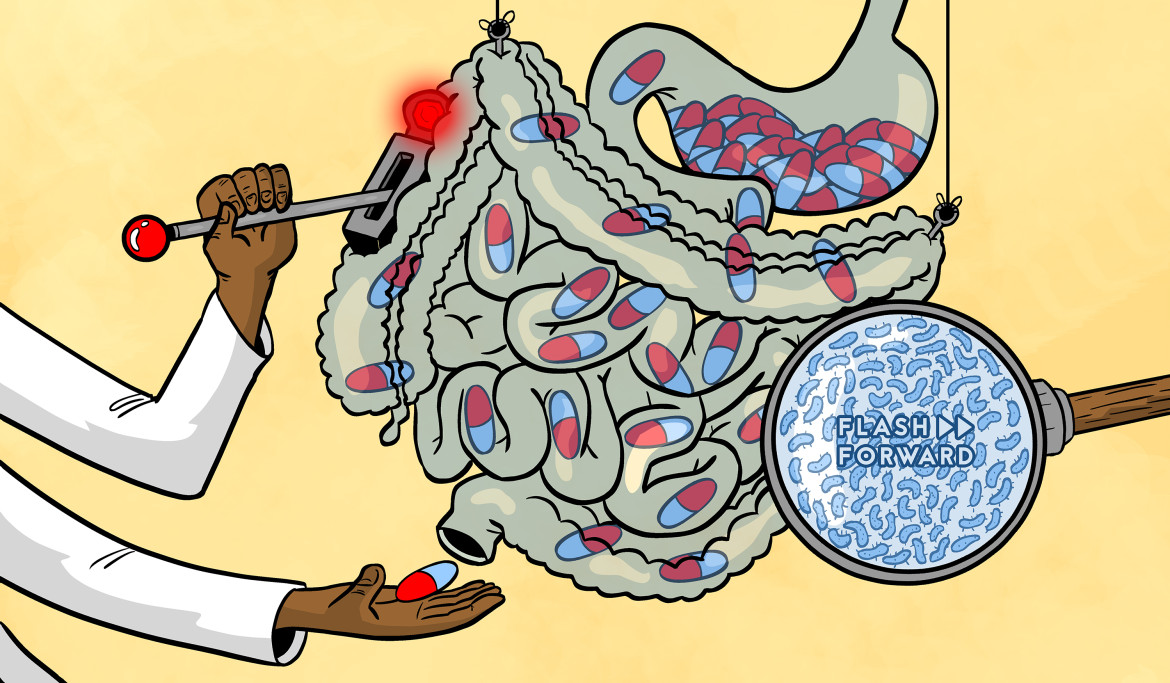

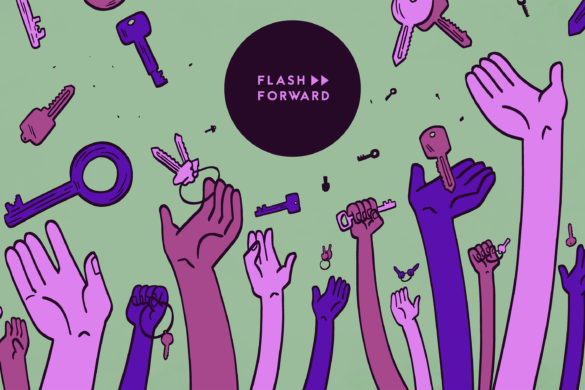
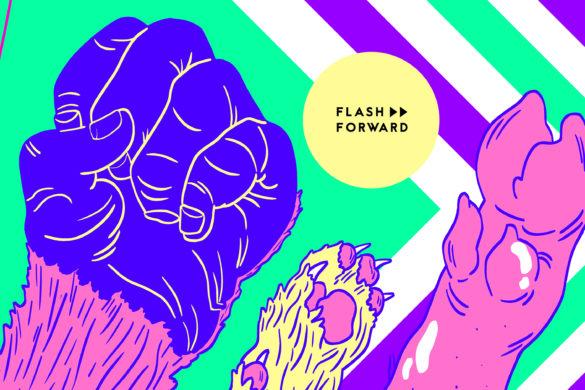
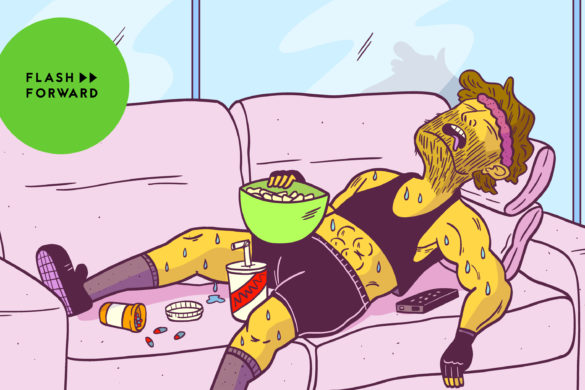
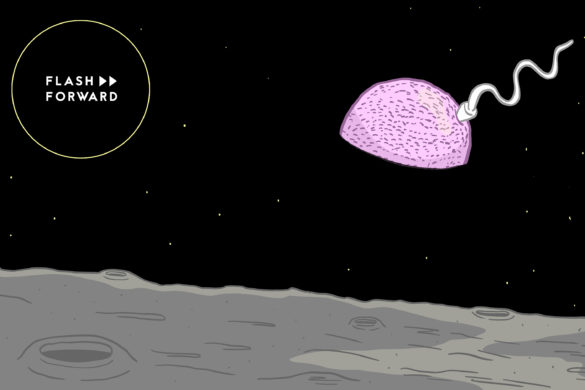
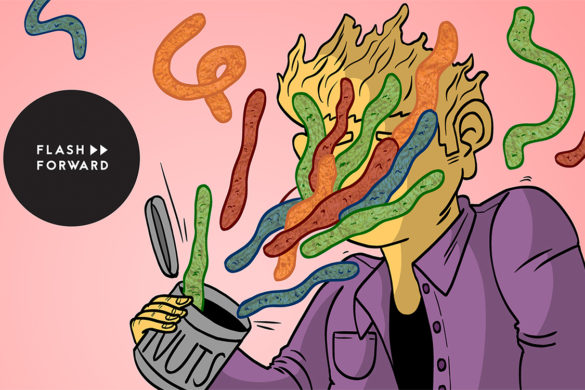
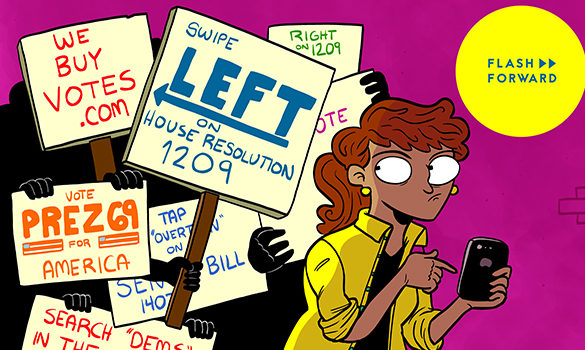
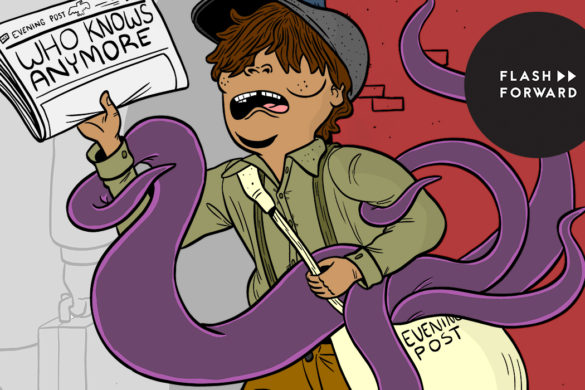
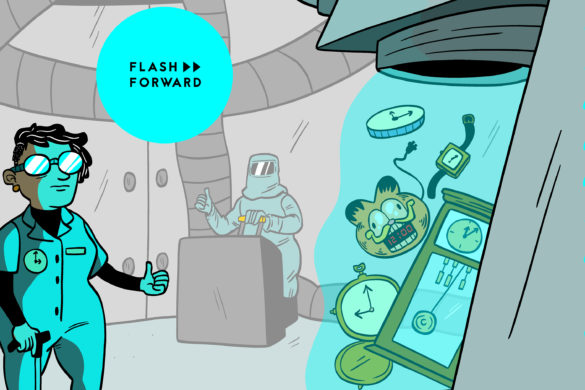
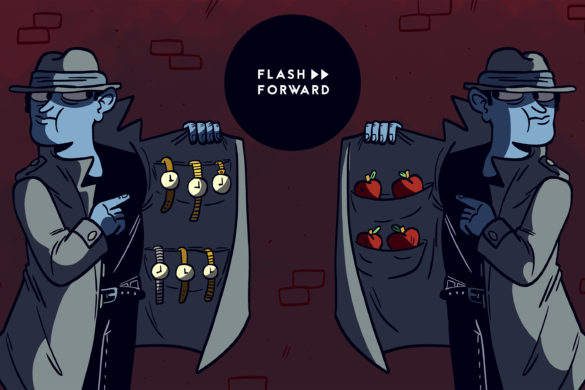
12 comments
[…] ▹▹ Full show notes […]
[…] ▹▹ Full show notes […]
[…] this week’s episode of Flash Forward, Rose Eveleth’s amazing podcast, I talk about microbiomes, and in no way do I suggest or condone kidnapping […]
[…] March 5, 2016 at 10:03PM via Digg […]
[…] 05: Micro But Mighty | Flash Forward […]
[…] or C. diff. As “Flash Forward” podcast producer/host Rose Eveleth explains on the episode “Micro But Mighty,” C. diff is a bacterial infection that “totally ravages the guts of those infected with it.” […]
[…] recs: Micro But Mighty, The Altered State, Bye Bye […]
[…] recs: Micro But Mighty, The Altered State, Bye Bye […]
[…] recs: Micro But Mighty, The Altered State, Bye Bye […]
Could someone tell how can I download the podcast?
You can use any podcast listening app like Apple Podcasts, Casts, Castro, Stitcher, to hear it. Here’s a step by step guide: http://computer.howstuffworks.com/internet/basics/podcasting2.htm
Or you can simply listen through the player that’s embedded in each post.
[…] Micro But Mighty […]